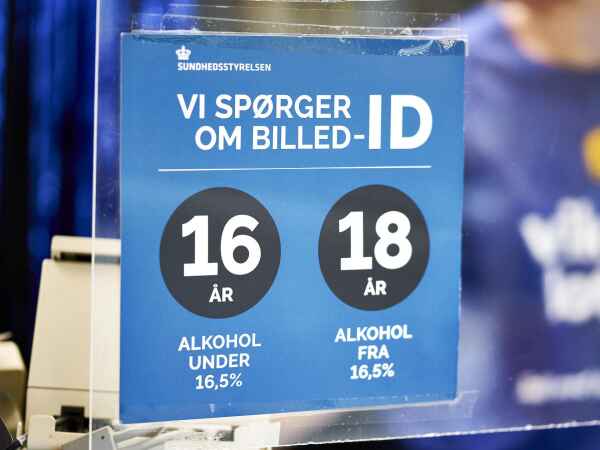This website uses cookies to improve your experience. We'll assume you're ok with this, but you can opt-out if you wish. Read more
Danish youth under siege
Danish youth under siege
These are tough times for young people. In America and elsewhere, teenagers and college students are reporting high levels of anxiety, depression, and suicidal thinking. Many of their elders have acquired a comfortable standard of living because of the rising real estate market, and now Gen Z is saddled with debt, expensive housing, and global warming. Danish youth also feel that their rights and entitlements are being threatened by an older generation that doesn’t appreciate their difficulties.

Age limits for buying alcohol. Photo: Signe Goldmann © Ritzau Scanpix.
Last month the Social Democratic administration’s reform commission released its recommendations for education. They included stopping grants for master’s degree students (DK). Not only is higher education free in Denmark; all students at secondary schools and universities receive stipends, in fact the largest in the world. At the university level, students are eligible for six years of funding, and in 2022 the amount for those who don’t live with their parents is DKK 6,397 (just under $1,000) per month (DK). A bachelor’s degree normally takes three years, and most students continue in a master’s program for two additional years.
The commission proposed converting the grants to loans. The reasoning was that master’s degree holders usually have a high income and could easily afford to repay loans of around $24,000. The proposal brought an immediate outcry from students’ organizations, who argued that they’re already on tight budgets, particularly because of a sharp rise in housing costs in the larger cities. The left-wing parties backed them up, and the Social Democratic administration, which also courts younger voters, said it had no plans to end the grants.
Life without nicotine
In March the administration itself issued two proposals to improve young people’s health (DK) that made few people happy. The Health Authority had wanted to eliminate smoking among children and young people, but recent surveys have showed increasing e-cigarette and snuff use by the young. So it decided to prohibit the purchase of all nicotine products by anyone born after 2010. That would mean a total ban for life. In 2051, a 41-year-old would be able to smoke cigarettes, but her 40-year-old partner would not.
MPs from several parties protested adamantly against imposing a ban on adults. Most preferred the usual disincentive of raising the price of tobacco. But the proposal fizzled out when it was found to violate EU rules (DK), which forbid any limitations on tobacco marketing.
Hands off my afterschool sixpack
The administration also proposed banning the sale of alcohol to anyone under 18. Denmark leads the world not only in educational grants but also in teenage drinking (is there a connection, or did the drinking antedate the grants?). It has had a lenient policy on alcohol sales. The first age restriction (15 years) wasn’t enacted until 1998. The current age requirement is 16 for drinks with an alcohol percentage under 16.5 percent and 18 for stronger stuff. Some 75 percent of ninth graders have had a drink in the past month versus an average of 37 percent for the rest of Europe, and 59 percent have been binge-drinking (defined as more than four drinks on an occasion) in the past month.
This proposal also met stiff resistance from various quarters. Conservative MP Per Larsen opposes the proposal “because we also need young people to get an introduction to alcohol.” Its most passionate critic is the chair of the Social Democrats’ own youth organization (DSU). Frederik Vad Nielsen argues tirelessly that alcohol consumption by Danish youth has been declining for years and that the older generations’ position is hypocritical (DK). Their consumption was worse when they were teenagers, and it’s worst of all now among the baby boomers who want to ban it for their more sensible descendants.
Defending the tipsy Danish soul
What does the alcohol industry think of this plan? The Danish Brewers’ Association hired the Minister of Justice (DK) as its new director. Probably only a humorous coincidence. Nick Hækkerup began promoting his new employer (DK) in the same Facebook post announcing his retirement from politics: “The brewery industry creates products that are a concentrate of the Danish people’s soul (folkesjæl) in the form of quality of life, diversity, and pride.” (Bullshit Bingo players are asking whether this concentrated diversity alludes to the variety of pilsners, ales, and local, micro, and special-edition brews for Christmas, Easter, and so on.)
When asked whether the job offer had anything to do with his own party’s proposal and what he thinks of it now, he said that he “noticed that young Social Democrats prefer to consider the alcohol percentage limit rather than the age limit.” Hækkerup’s move prompted criticism of the growing tendency of politicians to take positions as lobbyists. Others speculated about whether Hækkerup wanted to avoid the fallout from the ongoing mink and Defense Intelligence Service scandals that have bedeviled the administration.
School for sadists
Especially with Hækkerup on their side, it looks like young people will retain all these privileges, but a bombshell TV2 documentary (DK, paywall) has revealed that some of Denmark’s most privileged youth have been severely persecuted by their fellows. Herlufsholms hemmeligheder (Herlufsholm’s secrets) follows pupils at the country’s most prestigious boarding school, which was founded in 1565 and has educated several members of the royal family. The report uncovered many disturbing instances of bullying, harassment, and violence by senior pupils in the prefect system made infamous at exclusive English public schools such as Eton and Harrow.
Even though the documentary seemed sensationalistic, it appeared likely that some of these abuses must have been known to the administration and teachers. The rector has resigned, and the board has appointed an independent investigator. Meanwhile, alumni and parents are protesting that the report wasn’t representative of their wonderful institution. But this is a still-developing story for another time.



1 Comment
These posts are great. Helps me overcome my americentric view of things